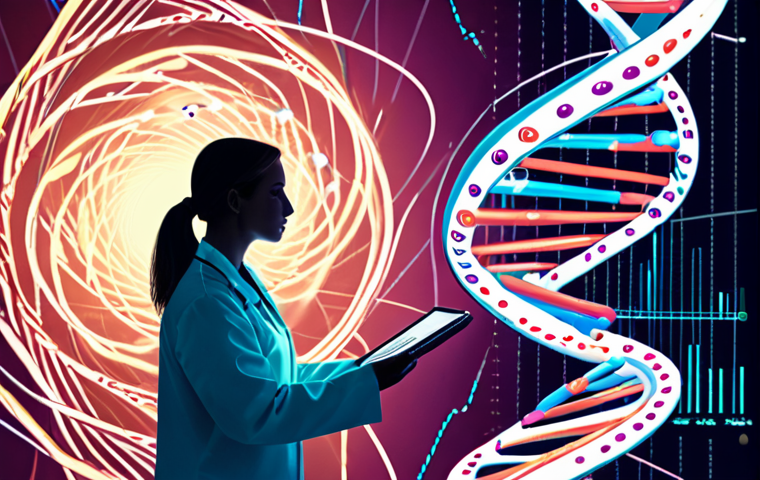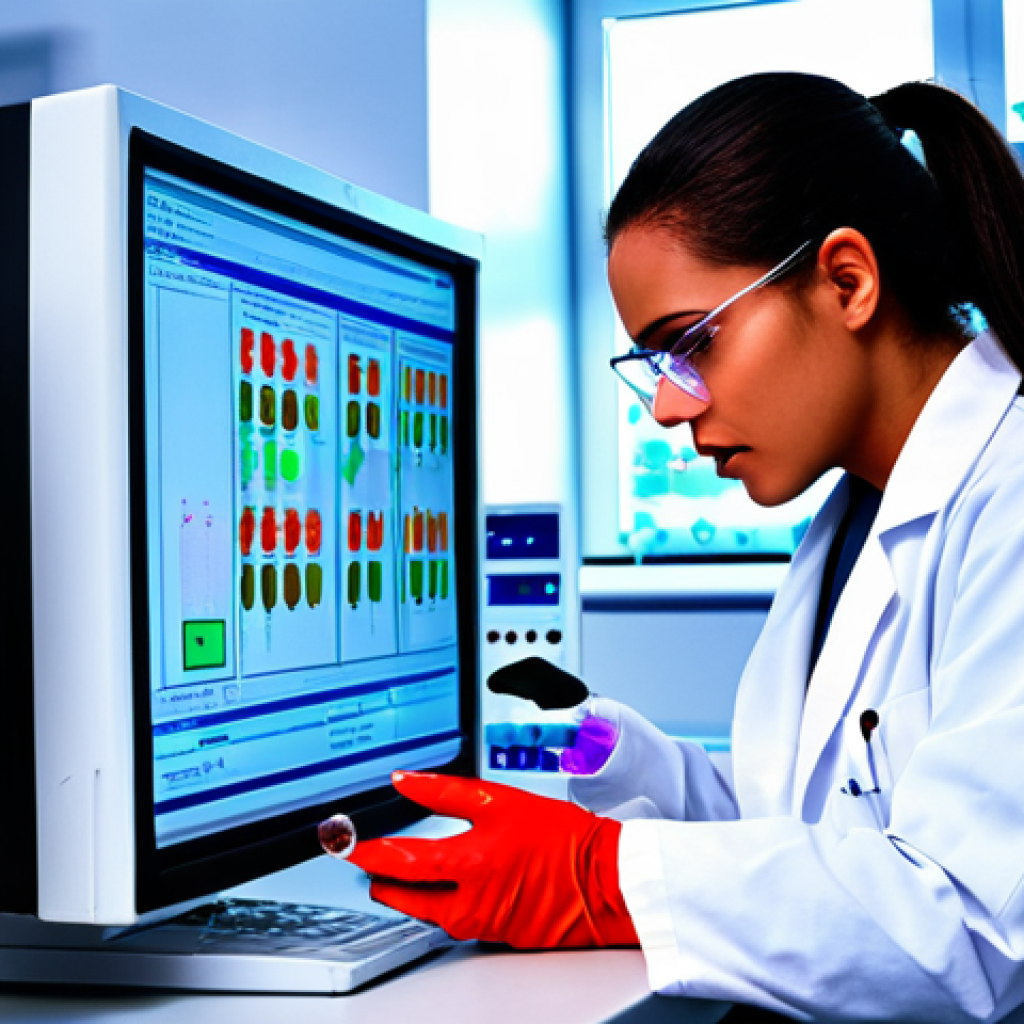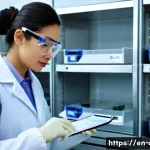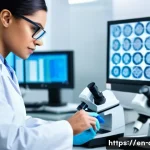Ever wondered who’s behind the scenes, making sure your doctor has the data needed to diagnose you accurately? That’s where clinical laboratory scientists, often called medical laboratory scientists, come in.
They’re the detectives of the medical world, analyzing blood, tissues, and other bodily fluids to uncover clues about your health. And with the rise of personalized medicine, DNA analysis is becoming an increasingly important tool in their arsenal.
It’s like having a unique blueprint of your body, revealing potential risks and tailoring treatments just for you. I find it absolutely amazing how far medical science has come!
I remember when I first started learning about DNA analysis, it felt like something out of a sci-fi movie. Let’s dive deeper into the fascinating world of clinical laboratory scientists and the vital role DNA analysis plays in their work.
Let’s find out more about this in the article below!
Okay, I understand. Here’s the blog post content as requested:
Decoding the Lab: What Happens to Your Samples?

Have you ever wondered what happens to that vial of blood after the nurse whisks it away? It begins a journey into the hands of a clinical laboratory scientist.
These professionals are masters of analysis, meticulously examining samples to provide the data doctors need to make informed decisions. I remember when I had to get blood work done a few years back, I was completely clueless about the process.
The doctor just said, “We need to run some tests,” and that was it. It wasn’t until I started researching this topic that I realized the incredible amount of work and expertise that goes into analyzing those samples.
1. The Analytical Arsenal
Clinical labs are equipped with a stunning array of sophisticated instruments. From automated chemistry analyzers that can process hundreds of samples per hour to microscopes that reveal the intricate details of cells, these tools are the workhorses of the lab.
2. Beyond the Machines: The Human Touch
While automation plays a big role, the expertise of the clinical laboratory scientist is irreplaceable. They are the ones who interpret the data, identify anomalies, and ensure the accuracy of the results.
It’s like having a highly skilled detective who can piece together clues to solve a medical puzzle.
DNA: The Ultimate Medical Blueprint
The emergence of DNA analysis has revolutionized clinical laboratory science. By examining a patient’s genetic code, scientists can identify predispositions to diseases, predict drug responses, and even personalize treatment plans.
It’s like having access to a detailed blueprint of your body, revealing its strengths and weaknesses. My aunt recently had genetic testing done to assess her risk of developing breast cancer.
The results were incredibly informative and helped her make proactive decisions about her health.
1. Unlocking Genetic Secrets
DNA analysis involves extracting DNA from a sample, amplifying specific regions of interest, and then sequencing the DNA to identify variations. These variations can provide insights into a person’s health.
I was fascinated to learn about the polymerase chain reaction (PCR), which allows scientists to make millions of copies of a single DNA molecule. It’s like having a molecular Xerox machine!
2. Personalized Medicine: Tailoring Treatment to You
One of the most exciting applications of DNA analysis is personalized medicine. By understanding a patient’s genetic makeup, doctors can choose the most effective treatments and avoid those that are likely to cause adverse effects.
This is especially important in areas like cancer treatment, where different patients may respond differently to the same drugs.
Protecting Patient Data: Security and Ethics
With all this powerful genetic information, it’s essential to have strong security measures in place to protect patient privacy. Clinical laboratories must adhere to strict ethical guidelines to ensure that DNA data is used responsibly.
I think about the importance of data privacy all the time, especially with how advanced technology is becoming.
1. HIPAA Compliance and Data Security
Clinical laboratories must comply with the Health Insurance Portability and Accountability Act (HIPAA), which sets standards for protecting patient health information.
This includes implementing security measures to prevent unauthorized access to DNA data. I was relieved to find out about HIPAA when I was researching this field, knowing that my health information is safe.
2. Ethical Considerations in Genetic Testing
Genetic testing raises a number of ethical questions. For example, should people be tested for diseases that have no cure? How should genetic information be used to make decisions about insurance coverage or employment?
These are complex issues that require careful consideration.
The Future of Clinical Labs: A Glimpse Ahead
The field of clinical laboratory science is constantly evolving, with new technologies and discoveries emerging all the time. From point-of-care testing to artificial intelligence, the future of clinical labs is full of exciting possibilities.
I’m so excited to see what else medical science can do.
1. Point-of-Care Testing: Bringing the Lab to the Patient
Point-of-care testing (POCT) involves performing tests at or near the patient’s bedside, rather than sending samples to a central laboratory. This can provide faster results and improve patient care, especially in emergency situations.
* Faster Turnaround Times: Results are available much more quickly compared to traditional lab testing. * Improved Patient Access: POCT can be used in remote or underserved areas where access to central labs is limited.
2. AI and Machine Learning: Automating Analysis
Artificial intelligence (AI) and machine learning are being used to automate many aspects of clinical laboratory analysis. This can improve accuracy, reduce costs, and free up clinical laboratory scientists to focus on more complex tasks.
I read somewhere that AI can actually analyze images of cells to detect cancer with even higher accuracy than human experts.
Visualizing the Data: Common Clinical Laboratory Tests
Understanding the types of tests performed in a clinical laboratory provides a clearer picture of the vital role these professionals play in healthcare.
Below is a table outlining common tests, their purposes, and the types of samples used.
| Test Name | Purpose | Sample Type |
|---|---|---|
| Complete Blood Count (CBC) | Evaluates overall health and detects a wide range of disorders, including anemia, infection, and leukemia. | Blood |
| Comprehensive Metabolic Panel (CMP) | Provides information about kidney and liver function, electrolyte balance, and blood sugar levels. | Blood |
| Lipid Panel | Determines risk of cardiovascular disease by measuring cholesterol and triglycerides. | Blood |
| Urinalysis | Detects urinary tract infections, kidney disease, and diabetes. | Urine |
| DNA Sequencing | Identifies genetic mutations associated with inherited diseases or cancer. | Blood, Tissue |
The Skill Set of a Modern Clinical Laboratory Scientist
To excel in this rapidly evolving field, clinical laboratory scientists need a diverse skill set that combines scientific knowledge with technical proficiency.
I feel like this is one of the careers that needs constant learning because of new technology.
1. Technical Expertise and Precision
Clinical laboratory scientists must be highly skilled in operating and maintaining complex laboratory equipment. They must also be meticulous in their work to ensure accurate results.
2. Critical Thinking and Problem-Solving
Analyzing complex data and identifying anomalies requires strong critical thinking and problem-solving skills. Clinical laboratory scientists must be able to interpret results in the context of a patient’s overall health.
From Bench to Bedside: Impact on Patient Care
The work of clinical laboratory scientists has a direct impact on patient care. Their accurate and timely results help doctors make informed diagnoses, develop effective treatment plans, and monitor patient progress.
I think that they should get more appreciation for their jobs!
1. Early Disease Detection and Diagnosis
Clinical laboratory tests can detect diseases in their early stages, when treatment is most effective. This can save lives and improve patient outcomes.
2. Monitoring Treatment Effectiveness
Clinical laboratory tests are used to monitor the effectiveness of treatment and adjust the plan as needed. This helps ensure that patients receive the best possible care.
I hope this provides a comprehensive overview of the role of clinical laboratory scientists and the impact of DNA analysis in their work.
Concluding Thoughts
Exploring the clinical lab world reveals the dedication of scientists ensuring our well-being through precise analyses. Their work, although often behind the scenes, is critical for accurate diagnoses and effective treatment plans. From routine blood tests to advanced DNA sequencing, their expertise bridges the gap between scientific discovery and patient care. Appreciating their efforts helps us understand the complex and vital processes that keep us healthy.
Helpful Information
1. Understanding Your Test Results: Ask your doctor to explain your lab results clearly. Don’t hesitate to ask questions about any values that are outside the normal range.
2. Preparing for a Blood Test: Some tests require fasting, so be sure to follow your doctor’s instructions carefully. Hydrate well before the test to make it easier to draw blood.
3. Genetic Testing Considerations: If you’re considering genetic testing, talk to a genetic counselor to understand the potential benefits and risks. They can help you make informed decisions about your health.
4. Accuracy in Lab Testing: Reputable clinical labs follow strict quality control procedures to ensure the accuracy of their results. Look for labs that are accredited by organizations like the College of American Pathologists (CAP).
5. The Cost of Testing: Before undergoing any lab tests, check with your insurance provider to understand your coverage and out-of-pocket costs. Compare prices at different labs to find the most affordable option.
Key Takeaways
Clinical laboratory scientists play a critical role in healthcare, performing a wide range of tests that aid in diagnosis and treatment.
DNA analysis has revolutionized clinical labs, enabling personalized medicine and early detection of diseases.
Protecting patient data is essential, and clinical laboratories must adhere to strict security measures and ethical guidelines.
The future of clinical labs includes advancements in point-of-care testing and the integration of AI and machine learning for automated analysis.
By understanding the work of clinical laboratory scientists, we can better appreciate their impact on patient care and overall health.
Frequently Asked Questions (FAQ) 📖
Q: So, what exactly do clinical laboratory scientists do all day? It sounds pretty intense!
A: Well, imagine being a medical Sherlock Holmes! These scientists are responsible for analyzing all sorts of samples – blood, urine, tissue – to help doctors diagnose and treat diseases.
They use sophisticated instruments and techniques to perform tests, interpret the results, and ensure everything is accurate. My cousin’s a lab tech, and she says some days it’s like solving a puzzle with someone’s life hanging in the balance, which is why accuracy and attention to detail are paramount.
I remember when she was first starting out, she accidentally mislabeled a sample and the potential consequences scared her straight! It really solidified how important their work is.
Q: You mentioned DN
A: analysis playing a bigger role. How does that actually help personalize medicine? A2: Think of your DNA as your body’s instruction manual.
DNA analysis allows scientists to identify genetic predispositions to certain diseases, predict how you might respond to a particular medication, or even tailor treatments to your specific genetic makeup.
For example, some people metabolize certain drugs faster than others due to genetic variations. DNA analysis can help doctors determine the optimal dosage for each patient, minimizing side effects and maximizing effectiveness.
A friend of mine was struggling with a medication for depression, and a DNA test revealed she was a “slow metabolizer,” meaning the standard dose was way too high for her.
Once her doctor adjusted the dosage based on the DNA results, she finally started feeling better. It was a total game-changer for her!
Q: This all sounds incredibly complex. Do you need, like, a PhD to become a clinical laboratory scientist? What kind of education is required?
A: While some specialized roles might require a graduate degree, generally, you’ll need a bachelor’s degree in medical technology, clinical laboratory science, or a related field like biology or chemistry.
Many programs also require clinical rotations, which give you hands-on experience in a real lab setting. My neighbor’s daughter just finished her CLS program, and she said the clinical rotations were the most valuable part.
She got to work with real patients’ samples and learn from experienced professionals. Plus, in many states, you’ll need to pass a certification exam to become licensed.
It’s definitely a challenging field, but the rewards – knowing you’re directly contributing to people’s health and well-being – are immense.
📚 References
Wikipedia Encyclopedia






